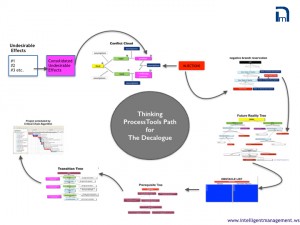We continue our series on what is needed today for leaders and managers that Business Schools are not offering. In the 21st century organizations need to shift away from the artificial limitations of traditional hierarchies and silos and this change does require a cognitive shift. As we pointed out in our previous post, people within the organization need to access a different realm of understanding of their role and view themselves as part of an organic, systemic, synchronized oneness. In order to facilitate this tapping into a higher level of consciousness, everyone has to fortify their ability to think systemically. They also need to systematically tackle unchallenged and often obsolete mental models.
Tapping into the Brain
When we recognize mental models for what they are, i.e. assumptions about reality that are not necessarily valid, this is already a big step in the right direction. When we are able to overcome them, then we pave the way towards much more attuned ways of interacting. Consequently, a fundamental aspect of the knowledge that should guide the actions of leaders is how the brain works and all the biases that it produces. These biases not only generate mental models, they may significantly alter the spectrum of possibilities that we are able to perceive. The implications of misjudging people and situations, especially for leaders, would invariably have a negative impact on the psychology of individuals and the organization as a whole. Such biases and mental models would also severely limit the ability to innovate and to harness the power of technology. The education of leaders should then be cognizant of how all these elements, cognitive, personal an technological are interconnected. This knowledge should inform the skills that they, as leaders, should nurture in the people of the organization.
What are the New Skills for Managers and Leaders?
So what are the skills needed for systemic organizations? We need look no further than the top 10 skills that will be needed for 2020 suggested in a report called ‘The Future of Jobs’ created for the World Economic Forum. See ‘The 10 Skills You Need to Thrive in the Fourth Industrial Revolution’
1. complex problem solving
2. critical thinking
3. creativity
4. people management
5. coordinating with others
6. emotional intelligence
7. judgement and decision making
8. service orientation
9. negotiation
10. cognitive flexibility
How can we educate and train people in these skills? The suite of Thinking Process Tools from the Theory of Constraints (TOC) provides a continuous stimulus and reinforcement for all of the ten skills mentioned above. Indeed, we can find in TOC and Deming’s Theory of Profound Knowledge all the theoretical and practical background to nuture these abilities in people.
Acquiring these skills is simply the practical aspect of gaining the higher consciousness suitable for managing a more evolved organization. This is the difference between training and education. For example, a Control Chart can be learned as a tool, but when it is fully understand as part of a paradigm stemming from the Theory of Variation then it becomes part of a process of upgrading our mental faculties, and therefore something much more meaningful than a ‘skill’.
The Future of Business Schools
If we compare the program we have presented in this post and the previous one (see ‘A New Curriculum for Business and Management’ ) with what is currently offered by Business Schools we can see that what is required is a complete transformation in the way we educate leaders and managers. Business Schools find themselves in difficulty when it comes to innovating their programmes because of the self-reinforcing cycle they are embedded in of approval, accreditation and funding. But innovate they must if they are to remain relevant. However, we believe that if educational institutions as well as executive education programs adapt to programs designed along the path we have illustrated then also conventional subjects like accounting and finance may find a useful space in an MBA course (leaders do need to read a balance sheet!)
In our next post we will look at Innovation and Technology as part of the path for transformation for leaders and managers.
About the Author
Angela Montgomery Ph.D. is Partner and Co-founder of Intelligent Management, founded by Dr. Domenico Lepore. Angela’s new business novel+ website The Human Constraint looks at how Deming and the Theory of Constraints can create the organization of the future, based on collaboration, network and social innovation.






Some of those new ‘skills’ mentioned in the article are similar or identical to the skills and tools I have been working on, for a better design/planning /policy-making discourse with wide participation. Ideas for the platform for the discourse (needing some integrated software), for the more systematic and transparent evaluation of planning arguments (the proverbial ‘pros and cons’ our fearless leaders always promise to carefully ‘weigh’ but can’t explain just how they do that; and for such issues as developing better ways to talk about value (of e.g. built environment) that is easier to connect to specific features of the environment and policies to improve things — approaching improved measures for ‘quality of life’. A number of papers about these issues on Academia.edu and my LI profile page, books on Time management for designers, the planning argument (“The Fog Island Argument”) and recent “Rigatopia” provide details. Questions and details on request: